For First-Year Students, ‘Week One’ Experiential Courses Bring Learning to Life
January 24, 2024
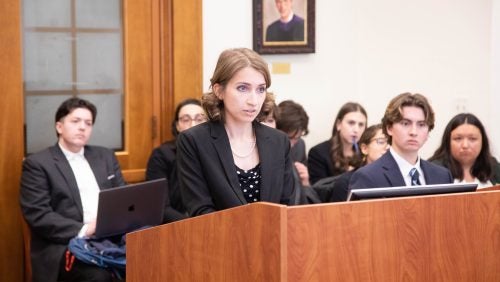
Students in the course "Extradition Simulation: International Law, Human Rights, and Effective Advocacy" presented their arguments in front of a mock tribunal.
"The sentence is not grossly disproportionate to the crime committed." That was the argument guiding Camryn Simmons, L'26, as she approached the bench for a mock terrorist extradition hearing in which she represented the United States before the European Court of Human Rights. Simmons was arguing in favor of the extradition of a suspected terrorist facing the possibility of a life sentence without parole — an argument complicated not only by the intricacies of international human rights law, but also by the fact that the hypothetical suspect was 19 years old and pregnant.
Dressed in formal courtroom attire, Simmons and her classmates were roleplaying as part of “Extradition Simulation: International Law, Human Rights, and Effective Advocacy,” a course offered as part of Georgetown University Law Center’s Week One simulations. The elective classes take place each year between the fall and spring semesters and include special offerings for first-year students that count towards experiential learning credits.
This January, more than 200 first-year students participated in 11 Week One courses that focused on timely legal topics ranging from artificial intelligence to climate change to white-collar crime. In contrast to the traditional 1L curriculum, which focuses on foundational legal doctrine and U.S. case law, Week One offers students hands-on experience with important aspects of real-world legal practice, such as trial skills, questioning witnesses and drafting legislation.
From preparation to courtroom
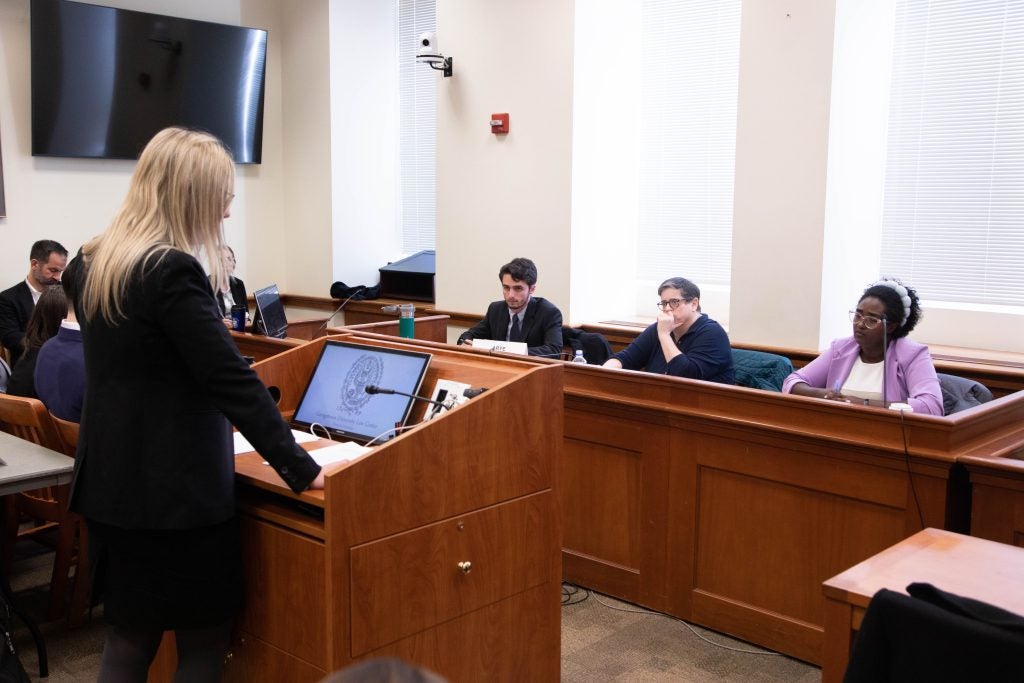
During the simulated extradition hearings, teaching fellows and guest judges posed as members of the European Court of Human Rights.
For Professor David Koplow, an expert in public international and national security law who has led the Week One extradition simulation for several years, the hearing was a success. “The 1L students performed extraordinarily well,” he said. “They went from zero to 60 in the space of just four days.”
Students in the course undertook several days of intense in-class preparation, including conducting client interviews and rehearsing their arguments, before appearing in front of a tribunal composed of teaching fellows and guest judges who posed tough, on-the-spot questions.
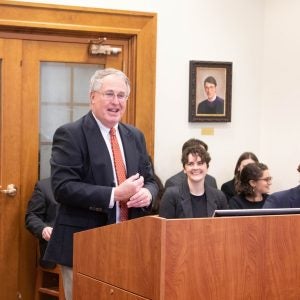
Prof. David Koplow
According to Koplow, the course not only offers valuable practice when it comes to oral advocacy and interviewing, but also gives first-year law students a sense of which type of law they may want to practice in the future.
“This class is not going to make you an expert in international law,” he told the class during a post-hearing debrief, “but it’s a step — a big step,” noting that Georgetown Law offers a number of options, including practicum courses, externships and legal clinics, for those seeking additional experiential opportunities.
For Simmons, the simulation also offered insight into the challenge lawyers face when making arguments that go against their personal beliefs.
Nevertheless, the hearing was Simmons’s favorite part of the course. “Going into the hearing, I felt it might be an uphill battle, but I enjoyed figuring out which puzzle pieces would overcome certain legal hurdles,” she said, noting that it was invigorating to dive into a body of law not covered in other 1L classes.
That sense of excitement was shared by the course’s teaching fellows and guest judges. “This simulation in particular is incredibly demanding, given the case law and international law involved,” said two-time guest judge Michele Poole, L’20, LL.M.’21, a past teaching fellow for the course and former Navy commander who now practices law in the U.S. Court of Appeals for Veterans Claims. “The students did a fantastic job.”
After the hearing, Poole praised the participants for their confidence and offered practical advice, such as the importance of maintaining decorum, eye contact and proper pacing during oral arguments. “We’re all lawyers in training,” she said. “Even once you’re admitted to the bar, you’re always learning.”
An ‘elusive opportunity’
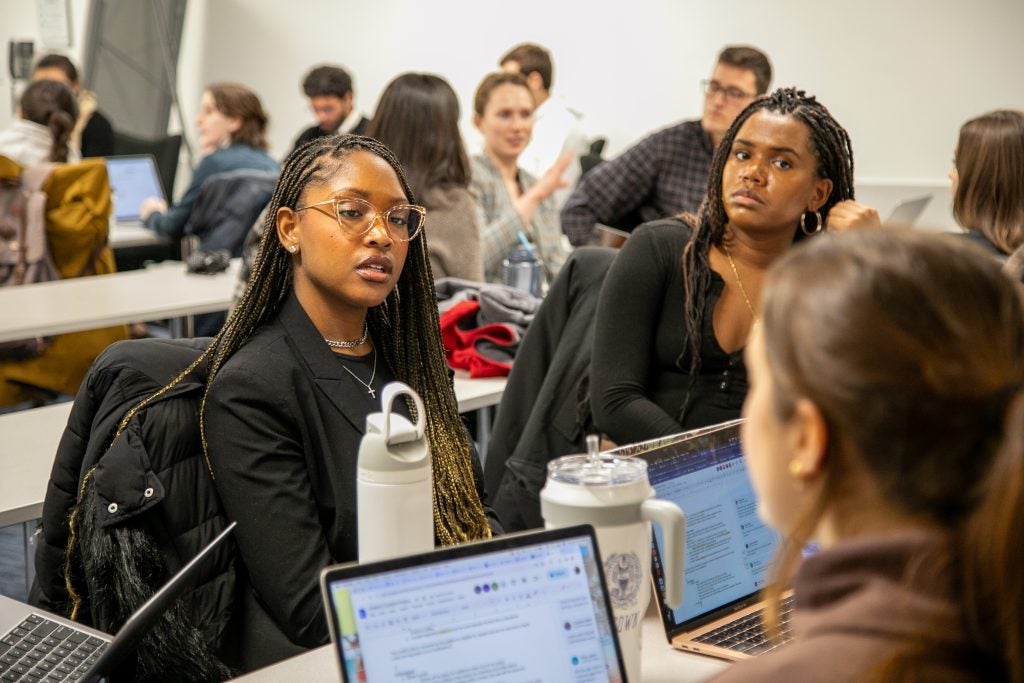
In “Regulating Online Speech in the Age of Social Media,” students broke into small groups to discuss questions related to regulating online content.
For Technology Law and Policy Scholar and RISE Fellow Leah DeFreitas, L’26, another Week One offering proved intriguing. She opted to take “Regulating Online Speech in the Age of Social Media,” a new course led by Mary Pat Dwyer, academic program director of the Institute for Technology Law & Policy.
The course focused on exploring tech platforms’ unprecedented influence when it comes to shaping and controlling online speech and identifying when government communication with tech platforms turns into unconstitutional censorship — a matter currently being debated in a number of high-profile cases before the Supreme Court.
In one activity, students were given records of real communications between different government agencies and social media platforms — for example, emails from the White House asking Facebook to remove certain posts — and asked to evaluate whether the interactions crossed the line into censorship from the companies’ point of view.
“There are a lot of recent legal developments that are going to dictate how we consume media and what companies are able to do,” said DeFreitas, who became interested in technology and media law because of her undergraduate background in journalism. “It was special to be able to take part in Week One in order to better understand those implications.”
Her favorite part of the course? Stepping into the role of a social media employee tasked with drafting company policy about violent content.
“To write our policy, we considered factors such as: What is our company’s mission? Is this a problem of individual liberties? Of freedom of speech?” she said. “There were a lot of questions that we were able to answer and explore.”
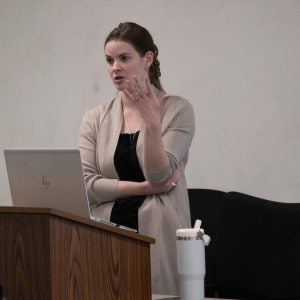
Instructor Mary Pat Dwyer
As course instructor, Dwyer was heartened to see that the students’ engagement with a timely — and sometimes controversial — topic became deeper and more nuanced as the week went on.
“During the first day of class, the groups seemed to view certain issues as straightforward,” she said. “But as additional facts and conundrums were presented, their policy determinations became more and more detailed.”
Teaching fellow Nathan Mosher, L’25, was similarly impressed by the students’ creative problem-solving when it came to applying First Amendment doctrine to online-speech issues. He was also grateful to gain teaching experience as part of the cohort of Week One fellows, upper-level students who help guide discussions for each class.
“Week One Courses offer an elusive opportunity in law school: to become a momentary expert in a new legal discipline,” Mosher said. “As a transfer student, it was precisely this kind of rare academic opportunity that motivated my decision to come to Georgetown Law.”